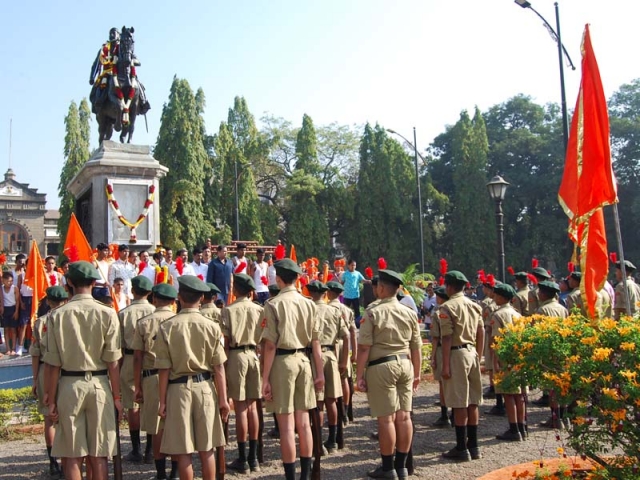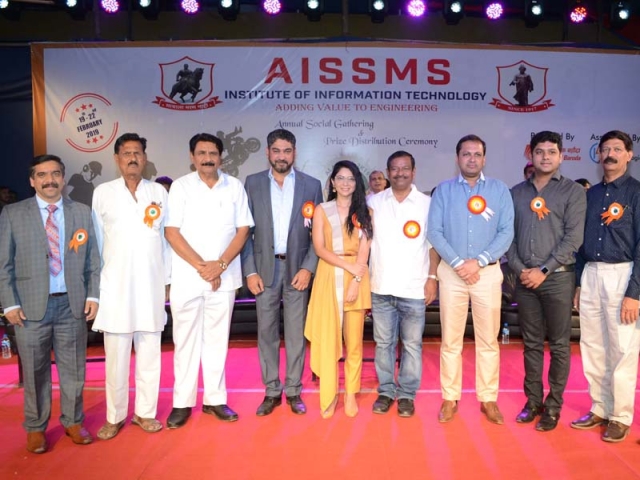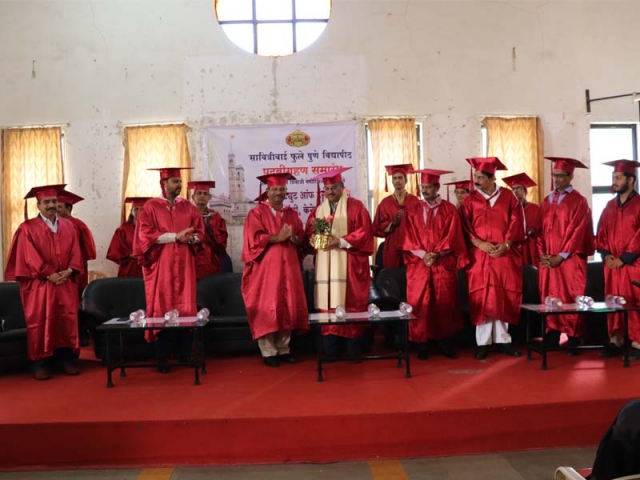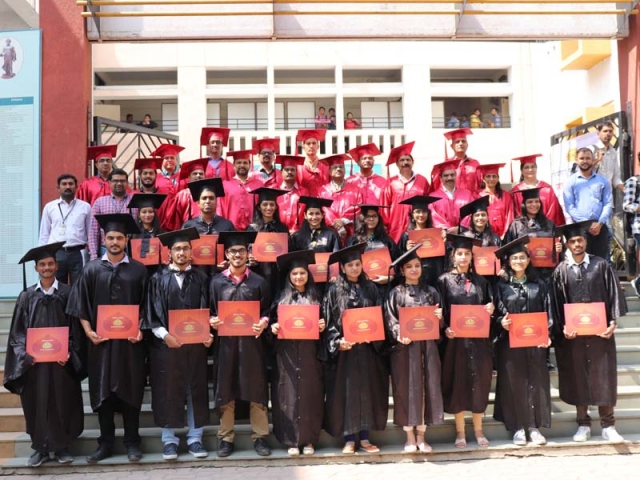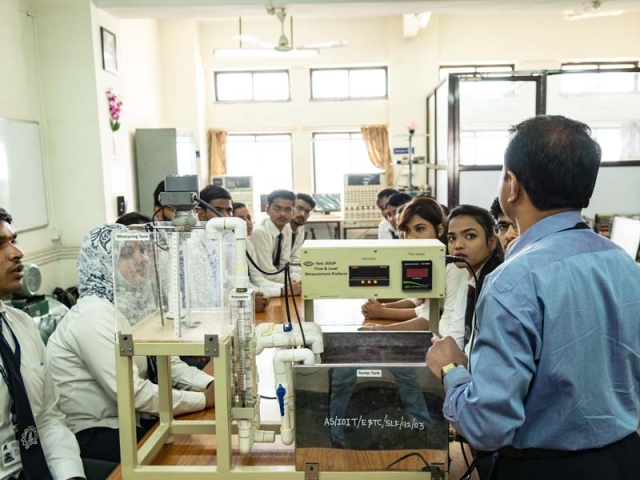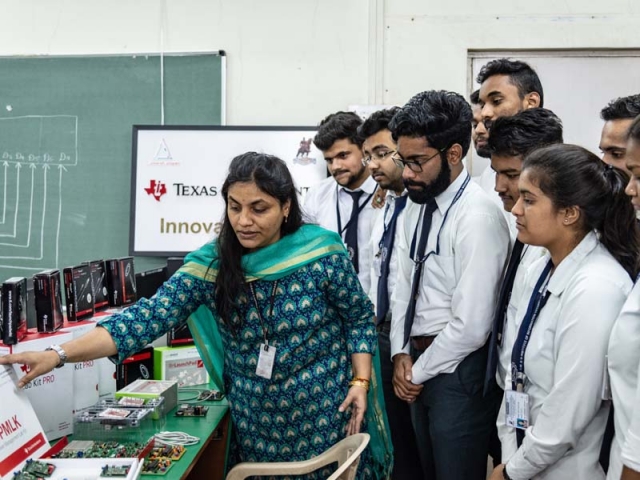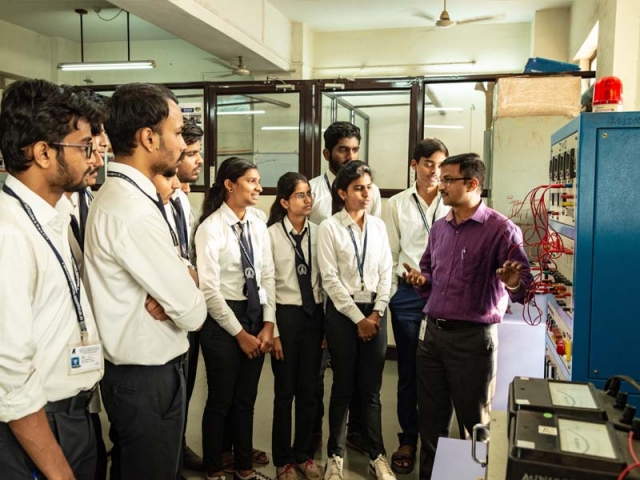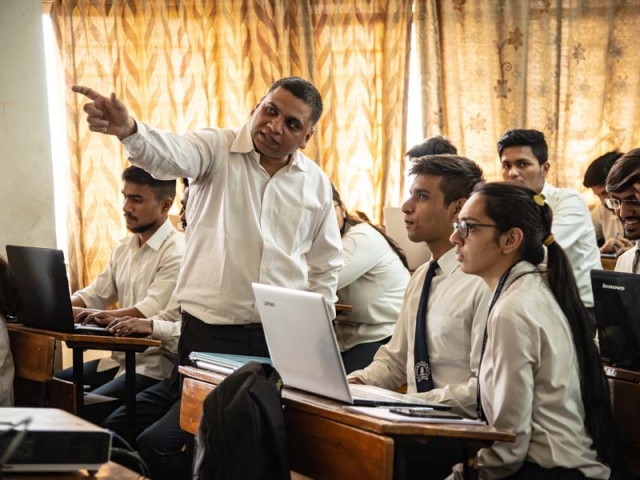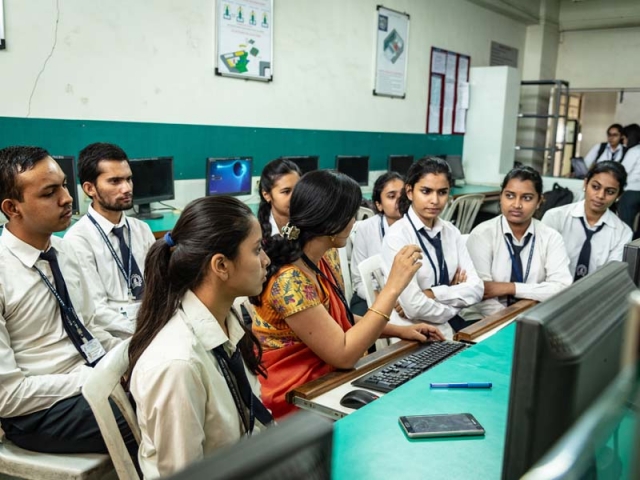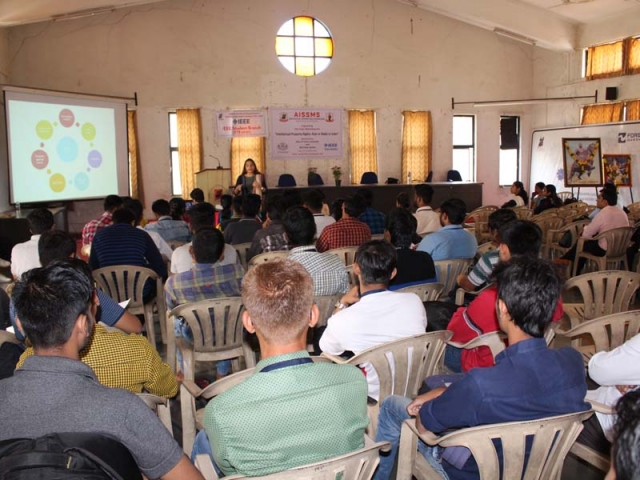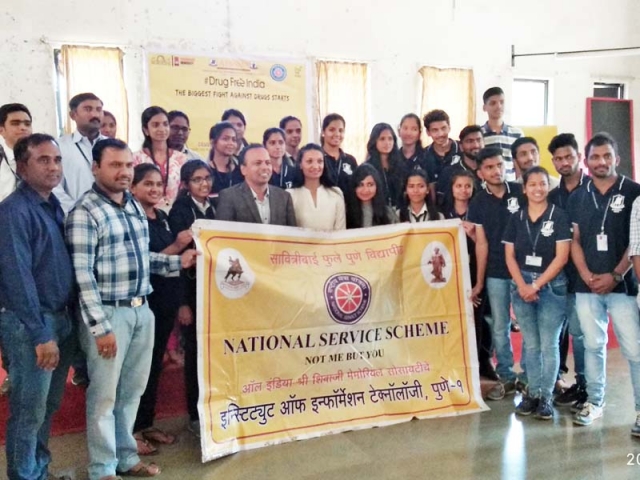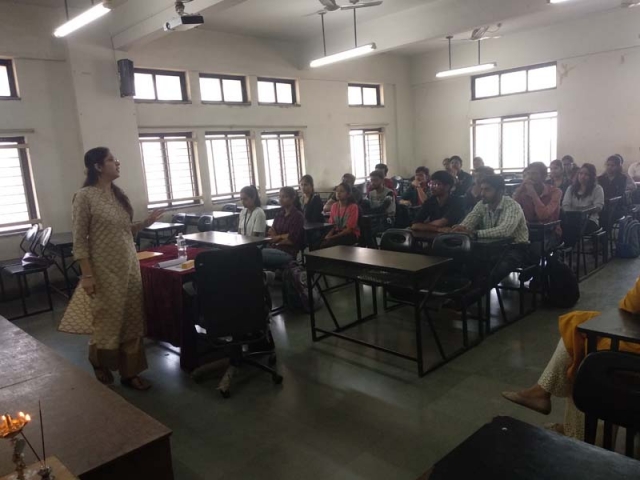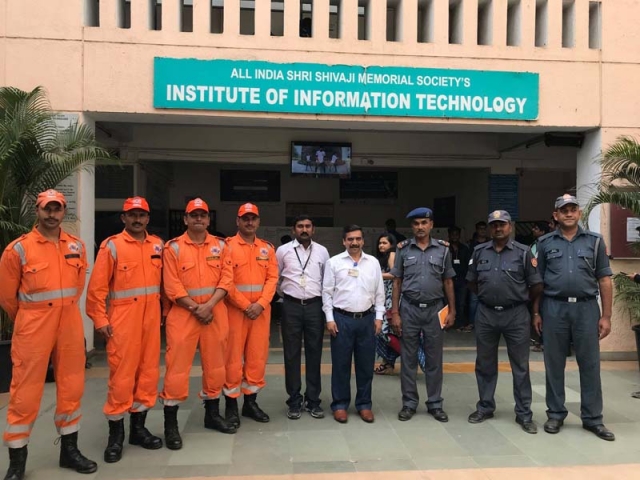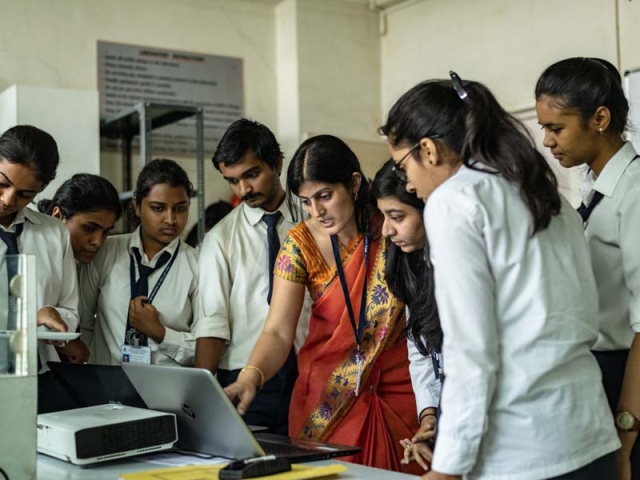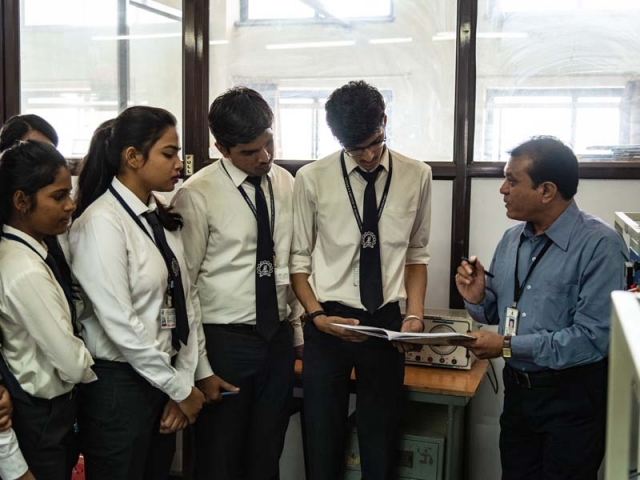Vision
To be known for imparting quality education in the field of electrical engineering and preparing competent professionals with high human values to serve the society
Mission
• To train the graduates with the latest technologies through industry institute interactions and
experiential teaching learning practices to meet the emerging global challenges.
• To enhance engineering skills, employability skills, and research through professional
activities.
• To develop globally competent electrical engineers with professional ethics and commitment
to society
experiential teaching learning practices to meet the emerging global challenges.
• To enhance engineering skills, employability skills, and research through professional
activities.
• To develop globally competent electrical engineers with professional ethics and commitment
to society
Program Educational Objective
- Investigate problems in electrical engineering and provide effective solutions.
- Excel in the professional career, research, higher studies, and entrepreneurship.
- Engage in lifelong learning by adapting a professional, social, and ethical attitude for contributing to societal needs.
PROGRAM SPECIFIC OUTCOMES
- PSO 1: The graduates will be proficient in software tools used for design and analysis of electrical systems.
- PSO2: The graduates will be able to acquire skills in electric mobility, power quality and renewable energy.
Program Outcomes
Graduates will be able to
- Apply the knowledge of mathematics, science, engineering fundamentals, and an engineering specialization to the solution of complex engineering problems. [Engineering knowledge]
- Identify, formulate, research literature, and analyse complex engineering problems reaching substantiated conclusions using first principles of mathematics, natural sciences, and engineering sciences. [Problem analysis]
- Design solutions for complex engineering problems and design system components or processes that meet the specified needs with appropriate consideration for the public health and safety, and the cultural, societal, and environmental considerations. [Design/development of solutions]
- Use research-based knowledge and research methods including design of experiments, analysis and interpretation of data, and synthesis of the information to provide valid conclusions. [Conduct investigations of complex problems]
- Create, select, and apply appropriate techniques, resources, and modern engineering and IT tools including prediction and modelling to complex engineering activities with an understanding of the limitations. [Modern tool usage]
- Apply reasoning informed by the contextual knowledge to assess societal, health, safety, legal and cultural issues and the consequent responsibilities relevant to the professional engineering practice. [The engineer and society]
- Understand the impact of the professional engineering solutions in societal and environmental contexts, and demonstrate the knowledge of, and need for sustainable development. [Environment and sustainability]
- Apply ethical principles and commit to professional ethics and responsibilities and norms of the engineering practice. [Ethics]
- Function effectively as an individual, and as a member or leader in diverse teams, and in multidisciplinary settings. [Individual and team work]
- Communicate effectively on complex engineering activities with the engineering community and with society at large, such as, being able to comprehend and write effective reports and design documentation, make effective presentations, and give and receive clear instructions. [Communication]
- Demonstrate knowledge and understanding of the engineering and management principles and apply these to one’s own work, as a member and leader in a team, to manage projects and in multidisciplinary environments. [Project management and finance]
- Recognize the need for, and have the preparation and ability to engage in independent and life-long learning in the broadest context of technological change. [Life-long learning]
| Course Outcomes of all Courses in Electrical Engineering Department | |
|---|---|
| Second Year (SE) | |
| Subject – Power Generation Technologies -C201 | |
| Course Outcomes : Students will be able to | |
| C201.1 | Identify operations of thermal power plant with all accessories and cycles. |
| C201.2 | Explain the principle of operation, components, layout, location, environmental and social issues of nuclear, diesel and gas power plant. |
| C201.3 | Identify and demonstrate the components of hydro power plant and calculation of turbine required based on catchment area. |
| C201.4 | Explain the importance of wind based energy generation along with its design, analysis and comparison. |
| C201.5 | Apply solar energy in thermal and electrical power generation considering energy crisis, environmental and social benefits. |
| C201.6 | Identify the operation of electrical energy generation using biomass, tidal, geothermal, hydel plants, fuel cell and interconnection with grid. |
| Subject – Engineering Mathematics-III (EM-III)-C202 | |
|---|---|
| Course Outcomes : Students will be able to | |
| C202.1 | Solve system of higher order linear differential equation and apply it to describe Electrical circuits. |
| C202.2 | Analyze Laplace transform and develop the tool of Laplace transform to solve system of Differential Equations. |
| C202.3 | Analyze Fourier transform and its applications to communication theory. Analyze and apply Z-transform for solving system of Difference equations and apply Z-transform in the analysis of discrete system such as linear time invariant system, signal system etc. |
| C202.4 | Transform physical phenomena into vectors, describe gradient, curl and divergence. Understand Vector Calculus and its applications to Electromagnetic field. |
| C202.5 | Solve Line, Surface, and Volume integrals with their applications in engineering. |
| C202.6 | Explain concept of Differential Calculus to function of Complex Variable and its applications to Potential theory, Electrostatics and Electromagnetic engineering. |
| Subject: Material Science C203 | |
|---|---|
| Course Outcomes: Students will be able to | |
| C203.1 | Classify different materials from Electrical Engineering applications point of view. |
| C203.2 | Explain and summarize various properties and characteristics of different classes of materials. |
| C203.3 | Select materials for application in various electrical equipment. |
| C203.4 | Explain and describe the knowledge of nanotechnology and batteries. |
| C203.5 | Test for different classes of materials as per Indian Standards (IS). |
| SUBJECT: Analog and Digital Electronics- C204 | |
|---|---|
| Course Outcomes: Students will be able to | |
| C204.1 | Use conversion of number system, perform binary arithmetic and reduce Boolean expressions by K- Map. |
| C204.2 | Demonstrate basics of various types of Flip flops, design registers and counter. |
| C204.3 | Analyze parameter of Op-amp and its applications. |
| C204.4 | Apply the knowledge of Op-amp as wave form generators & filters. |
| C204.5 | Use BJT as amplifier with various configurations. |
| C204.6 | Analysis of uncontrolled rectifier. |
| Subject -Electrical Measurements and Instrumentation- C205 | |
|---|---|
| Course Outcomes: Students will be able to | |
| C205.1 | Classify various instruments, explain constructional details of various indicating instruments and evaluate parameters related to range extension methods. |
| C205.2 | State and explain different methods of measuring resistance and suitability of respective method , measure resistance in various category, explain different methods used to measure inductance. |
| C205.3 | List and explain various methods of active and reactive power measurement, compare these methods, analyze different methods of power measurement by means of phasor diagrams and derivations, evaluate active and reactive power for different conditions of the circuit. |
| C205.4 | Explain constructional details and adjustments in induction type energy meter and digital energy meter, test the energy meter |
| C205.5 | Explain construction and working of cathode ray oscilloscope (CRO), demonstrate its use for measurement of electrical parameters, classify various transducers |
| C205.6 | Explain construction and working of various transducers used for measurement of level, displacement, strain. |
| Subject: Soft SKILLS- C206 | |
|---|---|
| Course Outcomes: Students will be able to | |
| C206.1 | Identify and map their strengths, weaknesses and relate them to the opportunities with understanding of threats |
| C206.2 | Communicate effectively by honing their speaking, listening, writing and presenting skills. |
| C206.3 | Demonstrate corporate and business etiquettes. |
| C206.4 | Develop interpersonal relationship through team work and group discussions. |
| C206.5 | Upgrade their leadership skills |
| C206.6 | Improve their employability skills, seek employment or be an entrepreneur by learning to manage time and stress. |
| SUBJECT: POWER SYSTEM-I C207 | |
|---|---|
| Course Outcomes: Students will be able to | |
| C207.1 | Recognize different patterns of load curve, calculate different factors associated with it and tariff structure for LT and HT consumers. |
| C207.2 | Aware of features, ratings, application of different electrical equipment in power station and selection of overhead line insulators. |
| C207.3 | Analyze and apply the knowledge of electrical design of transmission lines. |
| C207.4 | Analyze and apply the knowledge of mechanical design of transmission lines. |
| C207.5 | To identify and analyze the performance of transmission lines. |
| Subject- Electrical MACHINES-I C208 | |
|---|---|
| Course Outcomes: Students will be able to | |
| C208.1 | Apply fundamental laws /concepts to understand working principle of electrical machine. State classification of transformers, develop equivalent circuit and evaluate parameters of equivalent circuit, performance parameters of transformer using experimentation data. |
| C208.2 | Explain parallel operation and is need, various configurations of three phase transformer. |
| C208.3 | Explain constructional details of DC machine and concept of armature reaction |
| C208.4 | Classify DC motors, explain types of starters, various performance characteristics of DC motors. Evaluate the performance parameters of DC motor. |
| C208.5 | Explain rotating magnetic field concept, constructional details of three phase induction motor. Evaluate parameters of equivalent circuit, power flow. |
| C208.6 | Relate transformer –induction motor analogy, analyze the performance of three phase induction motor by plotting circle diagram. |
| Course Outcomes: Students will be able to | |
|---|---|
| C209.1 | Developing strong basics for network theory. |
| C209.2 | Develop the problem-solving technique for networks by application of theorems. |
| C209.3 | Identify the behavior of the network by analyzing its transient response using Classified methods. |
| C209.4 | Identify the behavior of the network by analyzing its transient response using Laplace approach methods. |
| C209.5 | Apply knowledge of Network theory for analysis of 2-port networks. |
| C209.6 | Apply their knowledge of network theory for designing special circuits like filters. |
| Subject: Numerical Method and Computer Programming – C210 | |
|---|---|
| Course Outcomes: Students will be able to | |
| C210.1 | Develop algorithms and implement programs using C language for various numerical methods. |
| C210.2 | Identify types of errors in computation and their causes of occurrence and apply concepts of roots of equations for solution of polynomial equation. |
| C210.3 | Identify various types of equations and apply appropriate numerical method to solve different equations and draw the curve of best fit for the given data points |
| C210.4 | Apply different numerical methods for interpolation, differentiation and numerical integration |
| C210.5 | Apply and compare various numerical methods to solve first and second order ODE |
| C210.6 | Apply and compare various numerical methods to solve linear simultaneous equations |
| Subject: Fundamentals of Microcontroller and Applications – C211 | |
|---|---|
| Course Outcomes: Students will be able to | |
| C211.1 | To list different blocks in architecture of 8051 microcontroller and explain the functions of each block. |
| C211.2 | To identify and interpret different addressing modes and instructions of 8051 microcontroller |
| C211.3 | Build and analyze program in assembly language for specific applications using various features of 8051 microcontroller and different software tools. |
| C211.4 | To build programs in assembly language using timers and interrupts. |
| C211.5 | Develop Interfacing circuits and assembly language programs for simple applications |
| Third Year (TE) | |
|---|---|
| Subject: Industrial and technology management- C301 | |
| Course Outcomes: Students will be able to | |
| C301.1 | Recall the basic definition, laws and concepts of managerial economics and state its importance. |
| C301.2 | Differentiate between different types of business organization, business ownership and discuss the levels of management. |
| C301.3 | Discuss the interdisciplinary nature of management of technology and explain management of technology at various levels. |
| C301.4 | Explain the quality management assistance tools, 5S principle, need of Six Sigma for process improvement and the ISO Quality Management Standards. |
| C301.5 | Analyze and apply the knowledge of technology, industrial, quality, marketing and financial management in his day-to-day life. |
| C301.6 | Recognize the importance of human resource management, motivation, group dynamics, team work, leadership skills, entrepreneurship, intellectual property rights, patents and laws and implement them in his day-to-day work efficiently and effectively. |
| Subject: Advance Microcontroller and its Applications-C302 | |
|---|---|
| Course Outcomes: Students will be able to | |
| C302.1 | To describe the internal organization and instructions of PIC18F458 microcontroller. |
| C302.2 | To describe the instructions of PIC18F458 microcontroller. |
| C302.3 | To build programs for PIC microcontroller in assembly level language and C using an IDE. |
| C302.4 | To use features like compare, capture, PWM, interrupt and Timers in developing programs for various applications |
| C302.5 | To interface PIC microcontroller with different peripheral devices. |
| Subject: Electrical Machines-II-C303 | |
|---|---|
| Course Outcomes: Students will be able to | |
| C303.1 | Explain constructional details of synchronous machines and develop equivalent circuit of synchronous generator |
| C303.2 | State various methods of finding voltage regulation and compare them, evaluate the voltage regulation and analyze the performance of synchronous generator. |
| C303.3 | To list various methods of staring synchronous motor, verify modes of operation and performance parameters of synchronous motor |
| C303.4 | To state and explain -speed control methods of three-phase induction motor, various constructional details and applications of special purpose motors. |
| C303.5 | To explain constructional details and application of AC series motor, evaluate various parameters with reference to equivalent circuit and phasor diagram |
| C303.6 | To classify various single-phase motors and evaluate parameters and state the applications of these motors. To test and determine performance parameters of synchronous machines and single-phase induction motor |
| SUBJECT: Power Electronics – C304 | |
|---|---|
| Course Outcomes: Students will be able to | |
| C304.1 | Develop characteristics of different power electronic switching devices |
| C304.2 | Reproduce working principle of power electronic converters for different types of loads |
| C304.3 | Analyze the performance of power electronic converters |
| C304.4 | Use Computer-aided techniques for the design of power converter circuits. |
| C304.5 | Reproduce the concept of Multilevel converters. |
| Subject: Electrical Installation, Maintenance and Testing (EIMT)-C305 | |
|---|---|
| Course Outcomes: Students will be able to | |
| C305.1 | Classify different types of distribution supply system and determine economics of power transmission. |
| C305.2 | Compare and classify various substations, busbars and earthing systems. |
| C305.3 | Demonstrate the importance and necessity of maintenance. |
| C305.4 | Analyze and test different condition monitoring methods. |
| C305.5 | carry out estimation and costing of internal wiring for residential and commercial installations |
| C305.6 | Apply electrical safety procedures. |
| Subject: SEMINAR AND TECHNICAL COMMUNICATION-C306 | |
| Course Outcomes: Students will be able to | |
| C306.1 | Demonstrate the ability to gather relevant technical data related to the selected topic by referring to journal papers, articles, datasheets and other technical documentation |
| C306.2 | Students will be able to read, understand, interpret and integrate technical information. |
| C306.3 | Develop professional writing skills by researching articles, papers and technical documentation related to the seminar topic |
| C306.4 | Develop presentation and communication skills required to present selected technical topics |
| C306.5 | Demonstrate and clarify his/her knowledge about the selected technical topic during interactions/discussions/question answer sessions. |
| SUBJECT: Power System-II (C307) | |
|---|---|
| Course Outcomes: Students will be able to | |
| C307.1 | Analyze power flow in transmission line its performance and its compensation technique. |
| C307.2 | Describe EHVAC transmission systems and analyze Corona and its effects. |
| C307.3 | Calculate pu system and its application to load flow with computational technique |
| C307.4 | Analyze power system network under symmetrical fault condition. |
| C307.5 | Analyze power system network under Unsymmetrical fault condition. |
| C307.6 | Demonstrate HVDC transmission systems and its control. |
| Subject: Control system i – C308 | |
|---|---|
| Course Outcomes: Students will be able to | |
| C308.1 | Apply systems theory to complex real-world problems to do modeling of physical system. |
| C308.2 | Determine time response of linear system. |
| C308.3 | Analyze stability and performance of linear time invariant system in time as well as frequency domain. |
| C308.4 | Identify the need of controller and design controller such as proportional derivative integral (PID) based on stability and performance based for linear time invariant system. |
| C308.5 | Analyze stability of system and controller performance using software such as MATLAB |
| Subject: Utilization of Electrical Energy-C309 | |
|---|---|
| Course Outcomes: Students will be able to | |
| C309.1 | Recognize different methods of electric heating and welding, apply the knowhow to design of heating elements for resistance furnaces. |
| C309.2 | Explain different types of electro-chemical processes, electrical circuits for refrigeration and air conditioning applications |
| C309.3 | Utilize the knowhow for demonstrating design of illumination scheme for indoor application and illustrate various terms relate to illumination engineering. |
| C309.4 | Classify systems of traction and track electrification and explain major equipment’s in traction system |
| C309.5 | Solve problems related traction mechanics and determine performance parameters related to traction mechanics. |
| C309.6 | Relate the motor characteristics and selection of particular motor for traction work, describe the railway signaling system |
| Subject: Design of Electrical Machines -C310 | |
|---|---|
| Course Outcomes: Students will be able to | |
| C310.1 | Explain the construction, principle of operation and performance of transformer and three phase induction motor. |
| C310.2 | Determine the main dimensions of single phase and three phase distribution type transformers. |
| C310.3 | Design the three-phase squirrel cage and slip ring induction motor. Determine main dimensions of three phase squirrel cage and slip ring induction motor. |
| C310.4 | Determine the heat losses, core losses and mechanical losses of induction motor and transformer and determine the performance parameters of transformer and three phase Induction motor |
| C310.5 | Develop the optimum design of machine and also use different software’s such as FEMM, AUTOCAD, EXCEL etc. for the design. |
| Subject: Energy Audit and Management- C311 | |
|---|---|
| Course Outcomes: Students will be able to | |
| C311 .1 | Interpret energy scenario, EC Act 2001, EA Act 2003 and ECBC. |
| C311 .2 | Explain principles of Energy management and energy manager duties, responsibilities. |
| C311 .3 | Distinguish various demand side management methods. |
| C311 .4 | Conduct preliminary energy audit and prepare systematic report. |
| C311 .5 | Select different energy conservation techniques in electrical applications and do financial analysis. |
| C311 .6 | Review the technical literature and summarize/present it. |
| Subject: ELECTRICAL WORKSHOP C312 | |
|---|---|
| Course Outcomes: Students will be able to | |
| C312.1 | Integrate electrical/electronic circuits to develop applications, |
| C312.2 | Simulate and test various electrical and electronic circuits. |
| C312.3 | Carry out survey of market to collect relevant data and interpret data from manuals/data sheets of different components involved in the circuits. |
| C312.4 | Produce the results of the testing in the form of report. |
| C312.5 | Develop arduino based interfacing circuits for various applications |
| Final Year (BE) | |
|---|---|
| SUBJECT: Power System Operation & Control (C401) | |
| Course Outcomes: Students will be able to | |
| C401.1 | Identify and analyze the dynamics of power system and suggest means to improve stability of system |
| C401.2 | Suggest the appropriate method of reactive power generation and control |
| C401.3 | Analyze the generation-load balance in real time operation and its effect on frequency and develop automatic control strategies with mathematical relations. |
| C401.4 | Formulate objective functions for optimization tasks such as unit commitment and economic load dispatch and get solution using computational techniques. |
| C401.5 | Utilize different software tools to analyze the various problems |
| C401.6 | Utilize technical resources, prepare and give oral presentations. |
| Subject: PLC and SCADA Applications- C402 | |
| Course Outcomes: Students will be able to | |
| C402.1 | Develop block diagram of PLC and explain the working. |
| C402.2 | Classify input and output interfacing devices with PLC. |
| C402.3 | Develop architecture of SCADA and explain the importance of SCADA in critical infrastructure. |
| C402.4 | Execute, debug and test the programs developed for digital and analog operations. |
| C402.5 | Design automation system for an industrial application that meets desired specifications and requirements. |
| C402.6 | Develop the confidence for self-learning by doing Projects in Automation.
|
| Subject: Power Quality (Elective I)-C403B | |
|---|---|
| Course Outcomes: Students will be able to | |
| C403b .1 | Distinguish between the various categories of power quality problems. |
| C403b .2 | Explain the voltage sag phenomenon and investigate the voltage sag problems. |
| C403b .3 | Classify various transients, apply techniques for over voltage protection and quantify flicker |
| C403b .4 | Perform power quality analysis and use monitoring and various modern tools for the same |
| C403b .5 | Apply appropriate solution/ techniques for power quality mitigation based on the type of problem. |
| C403b .6 | Review the technical literature and summarize/present it. |
| Subject: Restructuring and Deregulation- C404A | |
|---|---|
| Course Outcomes: Students will be able to | |
| C404A.1 | Enlist the functions of various key entities in India and explain the implications of various policies and acts on restructuring and deregulation. |
| C404A.2 | Describe the regulatory process in India along with various methods of regulations. |
| C404A.3 | List the components involved in tariff determination and explain the phases of tariff determination. |
| C404A.4 | Describe and explain different power sector restructuring models and types of electricity markets |
| C404A.5 | State different transmission pricing methods and describe and compare various congestion management methods |
| C404A.6 | Students will demonstrate the ability to utilize technical resources, prepare and give oral presentations |
| Subject: Electric and Hybrid Vehicle – C404D | |
| Course Outcomes: Students will be able to | |
| C404D.1 | Review history, Social and environmental importance of Hybrid and Electric vehicles. |
| C404D.2 | Describe the performance and selection of energy storage systems |
| C404D.3 | Describe the various battery charging systems and explain battery management system |
| C404D.4 | Compare the performance and architecture of various drive trains. |
| C404D.5 | Describe the different Instrumentation and Control used for electric vehicles. |
| C404D.6 | Differentiate between Vehicle to Home, Vehicle to Vehicle and Vehicle to Grid energy systems concepts. |
| Subject: Control System 2-C405 | |
|---|---|
| Course Outcomes: Students will be able to | |
| C405.1 | Develop the basic digital control scheme and recognize the importance of digital control system. |
| C405.2 | Determine the pulse transfer function and apply the Z-transforms to solve problems. |
| C405.3 | Analyze digital controllers and do the stability analysis by applying various stability tests. |
| C405.4 | Convert the given system in state space format. |
| C405.5 | Solve state equation and design observer for the given system. |
| Subject: PROJECT I-C406 | |
| Course Outcomes: Students will be able to | |
| C406.1 | Apply the knowledge of mathematics, science and engineering fundamentals to the solution of complex engineering problems. |
| C406.2 | Implement practically, ideas/real time industrial problems/current application of respective/multidisciplinary engineering branches. |
| C406.3 | Apply project management skill to design system/product by taking into consideration different issues such as safety, ethics, social, health, legal, cultural and cost standards. |
| C406.4 | Use different modern tools and equipments like EDSA, PSIM, LabView, MATLAB, Keil, Lightpack, Proteus, DipTrace, RSLogix500 Factory Talk View Studio, PLC, Power analyzer etc. |
| C406.5 | Participate in National/International paper presentation/publication/ project competition activities. |
| C406.6 | Prepare Project Report (proposals) and present their project work in English. |
| SUBJECT: SWITCHGEAR & PROTEECTION -C407 | |
| Course Outcomes: Students will be able to | |
| C407.1 | Describe need, qualities, principles and basic terminology in switchgear and protection. |
| C407.2 | Identify, specify, select and test the characteristics of various LT switchgears. |
| C407.3 | Explain construction and working of different high voltage circuit breakers such as SF6 circuit breaker and Vacuum circuit breaker. |
| C407.4 | Classify and describe different type of relays such as over current relay, Reverse power relay, directional over current relay, Differential relay, Distance relay, Static relay and numerical relay. |
| C407.5 | Design and describe different protective schemes for transformer, alternators and busbars |
| C407.6 | Design and describe different protective schemes for transmission lines. |
| SUBJECT: Power Electronics Controlled Drives- C408 | |
| Course Outcomes: Students will be able to | |
| C408.1 | Analyze the operation and performance of the converter, chopper fed dc drive. |
| C408.2 | Describe braking methods of D.C. and induction motor drive. |
| C408.3 | Analyze the operation of both classical and modern induction motor drives. |
| C408.4 | Describe the current and speed controllers for a closed loop solid-state DC motor drive |
| C408.5 | Select the drives for any Industrial application. |
| Subject: High Voltage Engineering (HVE)- C409A | |
|---|---|
| Course Outcomes: Students will be able to | |
| C409A.1 | Explain and compare the various processes of breakdown in solid, liquid and gaseous dielectric materials. |
| C409A.2 | Illustrate different methods of generation of high voltages and currents. |
| C409A.3 | Identify and compare various techniques of measurement of high voltage and current. |
| C409A.4 | Analyze lightning and switching overvoltage. |
| C409A.5 | carry out high voltage testing of electrical apparatus |
| C409A.6 | Design and plan layout of high voltage laboratory. |
| Subject: Smart Grid (Elective IV)-C410A | |
| Course Outcomes: Students will be able to | |
| C410A.1 | Differentiate between Conventional and Smart Grid. |
| C410A.2 | Identify the Smart Grid components (RTU, IED, PMU) – and describe technologies – Micro Grid, Smart Substations Smart storage, Hybrid Vehicles |
| C410A.3 | Summarize Smart Meters, Advanced Metering Infrastructure, Smart Sensors, Smart Appliances, Home & Building Automation, (GIS). |
| C410A.4 | Distinguish different aspects of microgrid and solve power quality problems in smart grid. |
| C410A.5 | Apply the different communication technologies used in Smart Grid. |
| Subject: Illumination Engineering – C410C | |
|---|---|
| Course Outcomes: Students will be able to | |
| C410C.1 | Define and reproduce various terms in illumination design. |
| C410C.2 | Identify various parameters and criteria for the selection of lamps and lighting systems for an indoor or outdoor space illumination system design. |
| C410C.3 | Know about the energy efficient lighting system and its requirements and Perform calculations on photometric performance of light sources and luminaries for lighting design. |
| C410C.4 | Evaluate different types of lighting designs and design indoor and outdoor lighting system. lighting systems |
| C410C.5 | Enlist state of the art illumination systems. |
| Subject: PROJECT II -C411 | |
| Course Outcomes: Students will be able to | |
| C411.1 | Apply the knowledge of mathematics, science and engineering fundamentals to the solution of complex engineering problems. |
| C411.2 | Implement practically, ideas/real time industrial problems/current application of respective/multidisciplinary engineering branches. |
| C411.3 | Apply project management skill to design system/product by taking into consideration different issues such as safety, ethics, social, health, legal, cultural and cost standards. |
| C411.4 | Use different modern tools and equipment’s like EDSA, PSIM, LabView, MATLAB, Keil, Lightpack, Proteus, DipTrace, RSLogix500 Factory Talk View Studio, PLC, Power analyzer etc. |
| C411.5 | Participate in National/International paper presentation/publication/ project competition activities. |
| C411.6 | Prepare Project Report (proposals) and present their project work in English. |
